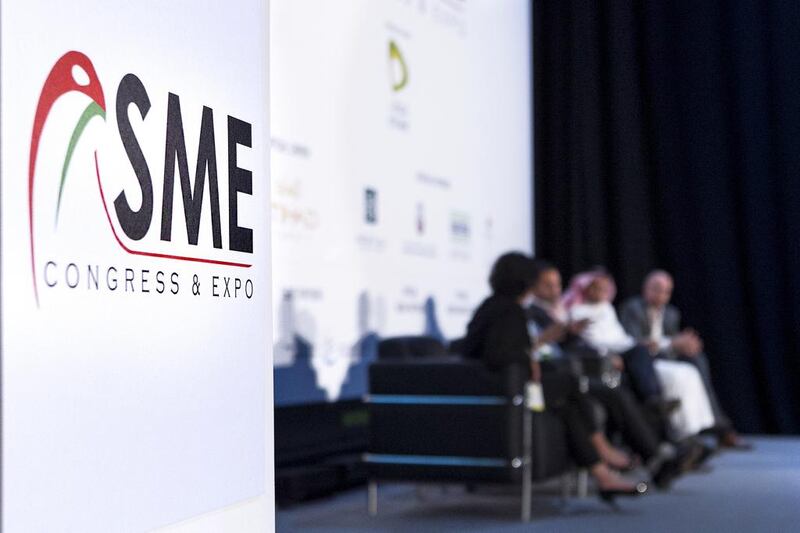Preparation, a mentor and networking are vital ingredients when setting up a business, an all-woman panel at the SME Congress and Expo in Abu Dhabi said yesterday.
But it was time that budding entrepreneurs moved beyond their “cupcake fetish”, those gathered also heard.
Contrary to expectations, perhaps, none of the women said their gender had posed any particular problems in starting a business.
The panel comprised Souad Al Hosani, the president of Nexus, a business relocation and services company; Lucy D’Abo, the managing partner at the Dubai public relations firm Dabo & Co; and Stevi Lowmass, the founder of Essential Soaps, a UAE producer of handmade soaps from camel milk. The topic for discussion was how to succeed in a male-dominated business environment.
“Red tape does not discriminate,” the panel’s chairwoman, Eithne Treanor, who founded an eponymous media training company, quipped, referring to the administrative hurdles that all those setting a company in the UAE must wrestle with.
Small and medium enterprises are crucial to any economy in creating jobs and generating growth, and women should not miss out on the opportunities available, she noted.
In the UAE, 92 per cent of all companies in the non-oil economy are SMEs, according to the Department of Economic Development. They account for 86 per cent of the workforce and 60 per cent of GDP.
The UAE Government considers the development of SMEs as crucial as the country diversifies its economy away from oil and gas over the next 15 years.
All three women agreed that preparation in advance of setting up a business was paramount.
“A very clear idea of what you need to achieve and what you want to achieve is the most important,” Ms Lowmass said. She said she had an experienced mentor on board who had run a multimillion-pound business in the United Kingdom.
“She is a useful sounding board,” Ms Lowmass said. “This was probably one of the most valuable things I’ve done in my business.”
Ms D’Abo noted that it was easy to underestimate the amount of preparation required in setting up a business. She said she had relied on books during her transition from a PR practitioner to PR firm owner. A particular favourite was Anyone Can Do It by siblings Sahar and Bobby Hashemi, who created Coffee Republic and who were the first to bring American-style coffee bars to the UK.
The book had a particular resonance because Ms D’Abo set up her company with her sister.
Ms Al Hosani said mentorshipwas particularly important for young Emirati women keen to start up businesses as they may have cultural and family resistance to overcome. They were also perhaps stifled by the fear of failure, which carried particular stigma in the UAE and the Middle East.
Organisations such as Injaz and the Khalifa Fund offered valuable support in this regard, Ms Al Hosani said, adding that she herself shared her experiences with students at colleges and universities in Abu Dhabi.
Once a business was up and running, the power of networking becomes apparent, they said.
“I am a member of the American, Swiss and Canadian business groups,” Ms Al Hosani said. “Most of my business comes from word of mouth and referrals rather than advertising.”
Ms Lowmass pointed out, though, that networking groups “can get hijacked by those who need to learn” and her strategy was to pick and choose groups on the basis of diversity and subject matter. Ms D’Abo agreed, saying she hosted a quarterly client get-together. This allowed clients that might not otherwise meet to do so. She said partnerships and sharing of knowledge had sprung from these informal gatherings. Clients included BMW and Nokia.
Getting funding is often the most difficult issue for any small business. Ms D’Abo said she had thought hard about whether to accept investment in return for an equity stake or to self-fund her business.
She and her sister chose the path of being “frugal and conservative” and expanding organically. This had the benefit of confirming her conviction in her business.
“There was no cushion so every decision is a big decision.” she said. “It’s different when you have huge backing.”
Sheikha Hend Faisal Al Qassemi, who delivered the keynote speech, encouraged potential female entrepreneurs to think creatively and move away from the “abaya and cupcake fetish” that women in the UAE seemed to have.
Ms Al Hosani noted the SME sector was primed to flourish over the next few years. “You cannot believe the number of investors who want to come to the UAE especially after [Dubai] won Expo 2020,” she said.
“We are all going to have to move fast since they are all jumping ship in Europe and coming here,” Ms Treanor said. “We have first starter advantage.”
lgutcher@thenational.ae





